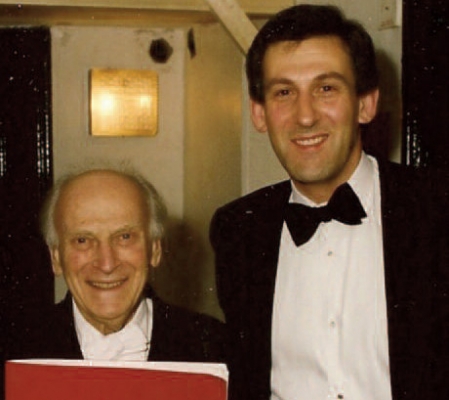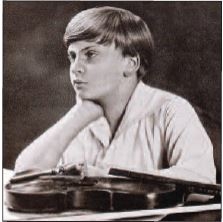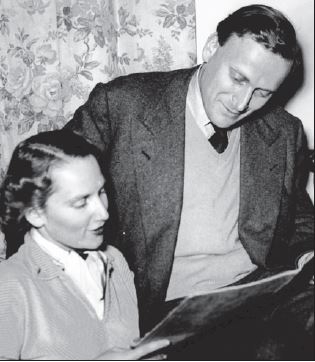Child Became a Musical Prodigy
I was Director of Music at The Yehudi Menuhin School in England for nineteen years from 1998 – 2017, and worked at the school on and off for forty years, starting as a young composition teacher in 1997. I got to know Menuhin and his family quite well over that period and worked particularly closely with him in the last year of his life. Indeed, after he died early in 1999, I was involved in organizing his funeral. He had written that he would like to be buried by a tree and a river. Honouring his wishes, his family chose to inter him in the school grounds, next to the tree that he planted on his eightieth birthday and not far from the River Mole. My eulogy was performed at the service along with music by Bach and Schubert. Rabbi David Goldberg, then of St John's Wood Liberal Synagogue, officiated and the Kaddish prayer was included in the ritual. The service was clearly Jew-ish, if somewhat unconventional.
In his old age, Menuhin had a reputation of being a calm, meditative, spiritual sage – a man of grace and kindness. At one of the libel trials of the notoriously satirical magazine Private Eye, Richard Ingrams, who was editor at the time, was asked by the judge if there were any public figures that his 'tawdry journal' would not lampoon. After a moment's reflection Ingrams replied, 'Mother Teresa and Yehudi Menuhin'!
However, the Yehudi Menuhin whom I knew was no saint; simply a great and an incredibly hard-working musician who cared passionately about the world – its environment, its societies and its politics. Yehudi was 'green' before the term was invented (he was one of the first people in England to have an electric car) and he was into 'World' and 'Crossover' Music before the terms had been coined – performing with the likes of Ravi Shankar and Stéphane Grappelli.
Photographed, filmed and interviewed almost daily since his early teens, he strode the world stage in a unique manner. He was equally at home talking to royalty and leading politicians as he was with the man in the street or the audience in the concert hall. Beyond all this, he was one of the greatest violinists of his era – of any era – playing with supreme musicality and with an unsurpassed sweetest of tone. He quite simply and directly communicated his profound love of the music to an audience, and the public invariably responded with fervent enthusiasm. The stage was his natural habitat and he was on it, as a violinist, or latterly as a conductor, most days of his life. He was a man of vision - a man of dreams, but also a man with a brilliant mind, full of pragmatism and practical determination.
Menuhin's relationship with the religion of his birth – indeed, with all religions - was a complex one, and, although there are many brilliant books about Menuhin's life and music-making (most notably his own autobiography - Unfinished Journey - and Humphrey Burton's excellent biography) I felt that, as we approached what would have been his hundredth birthday, his Jewish heritage was worthy of re-examination.
It was not by accident that Menuhin's parents called their first child Yehudi – Jew. When his mother was pregnant, the young married couple were about to sign a contract to rent a New York apartment, when the landlord, not realizing their religion, boasted of the pleasantness of the place, saying that no Jews were allowed. Of course, his parents rejected the apartment, looked for somewhere else to live, and vowed that their son would have a name that would always make his ethnic origin clear to one and all.
Yehudi's father, Moshe, was born in Belorussia and his mother, Marutha, came from Yalta. Both families moved to Palestine where the couple first met as children. Both then moved to America independently and came into contact again in their late teens. His father's family, through Yehudi's grandmother, could trace their line back to the great Chassidic Rabbi Levi Yitzhak of Berdichev, and Yehudi always claimed that his mother was of Tartar descent. Moshe and Marutha both worked as Jewish educators, but their progressive and unconventional approach led to difficulties in the orthodox communities of New York. With Yehudi still a babe-in-arms, the family moved to the West Coast, where Moshe eventually got a job running the Hebrew Schools of the Bay Area around San Francisco.
Yehudi and his sisters, Hephzibah and Yaltah, grew up in a culturally Jewish, but not observant, household. The children were home-educated, with tutors coming in when necessary. His mother instituted a strict routine of musical practice, academic work and time for play. In his autobiography, Yehudi writes of a golden childhood, but the regime must have been tough, disciplined and very rigorous. The children called their father 'Abba', and their mother 'Imma', and Chassidic songs were part of their daily life. They did not drive on the Sabbath. They did not keep kosher, but the parents did instil a fierce moral code, judging each individual on his or her own merits, whether rich or poor, socially eminent or not.
Yehudi's musical development is well documented. Starting the violin at the age of three, he developed as a child prodigy and was playing a concerto with the San Francisco Symphony Orchestra by the age of nine. For the most part, his mother supervised his education and, with his father managing his career, Yehudi became a world 'star' before he was in his teens, performing all over America and Europe, drawing hyperbolic reviews from critics and standing ovations wherever he went. Many of the great violinists of that era came of Jewish-Russian families – the Oishes and the Moishes, as Yehudi once described them - and perhaps this was because of the determination of the archetypal Jewish mother, keen that her son should play his way out of the ghetto and find material wealth.
The first piece ever written for the young Yehudi was a Jewish work. The composer, Ernest Bloch, who was head of the San Francisco Conservatory at the time, became a great friend of the Menuhin family and composed his arrangement of the Jewish prayer 'Abodah' especially for the young Yehudi in 1929. He performed this work many times and his father insisted that should play it on his first German tour in 1929. Later, Yehudi wrote that 'this choice of as traditionally Jewish a composition as one could wish for seems, in the light of what was soon to happen, a justified inspiration – more especially as the recital occurred in Munich, a city already known for its anti-Semitism.' Yehudi and Bloch remained friends throughout the composer's life and Yehudi performed much of Bloch's music. I had the privilege of helping him prepare the score of Bloch's Sacred Service which he conducted in St. Paul's Cathedral in 1995. He confided in me that he had not heard the work since Bloch, in Paris and excited at having just finished the piece, rushed over to the Menuhin family at their summer house, Villa d'Avray, and played the score to the assembled company with Yehudi, his family and his teacher, George Enescu, sight-singing the vocal parts over the composer's shoulder!
Yehudi refused to perform in Nazi-led Germany and throughout the Second World War he played for allied troops across the world. However, immediately when peace was declared, he and Benjamin Britten travelled to Germany and performed in the concentration camp at Belsen, as well as to German audiences, believing that music had the power to help bring harmony and reconciliation to a catastrophically broken society. This well-reported visit was not universally admired and nor was Menuhin's post-war support of the German conductor Wilhelm Furtwängler. I discussed this matter with Yehudi at the time when Ronald Harwood's play 'Taking Sides', which deals with the post-war United States denazification of the German musician, was on in London. Yehudi was insistent that, although Furtwängler had remained in Germany throughout the war and indeed performed in front of Hitler, he was not a Nazi and had helped many very eminent Jewish musicians – members of the Berlin Philharmonic - escape from Germany in the 1930s. Menuhin adored making music with the German conductor and was more than happy to perform with him after the war.The performances (and post-war recordings) of the Beethoven Violin Concerto represent an extraordinary pinnacle of refined music-making.
Many Jews found Yehudi's rapprochement with Germany hard to swallow, and Israeli opinion about him was always divided. Yehudi's relationship with Israel (and Israel's relationship with Yehudi) was somewhat ambivalent. In many ways, Yehudi's views echoed his father's long-held opinions. In the biography, Humphrey Burton describes Moshe as 'a spiritual Zionist, if not a political one' who was opposed to the creation of a national state. Yehudi wrote, 'My father was very Jewish. He understood the yearning, the dreams, that preceded Israel's foundation, but when it came to the machinations employed to establish the state, he balked.' Yehudi was much the same, finding 'no virtue in exclusivity'. However, when he visited for the first time in 1950, he found 'a tolerance that accepted the odd man out, that understood even my father and accepted me'. Later, in his autobiography, Yehudi wrote: ''though I can never be a Zionist nor concur in a purely nationalistic destiny, Israel has taken me by storm. It is in itself extraordinary that one of the world's oldest civilizations can be reborn with such vigorous youth.' He continues with some of the most poetically enthusiastic writing that one can find about the country, saying that 'this most youthful of countries contrives both to honor its past and not be shackled by it, making research in history, archaeology, custom, language and art a springboard for present endeavor, as if the Diaspora had only interrupted a destiny.' Yehudi met (and argued with) all the great Israeli leaders and generals, trying unsuccessfully to persuade Golda Meir to engage sympathetically with Palestinian refugees. What the Israeli politicians made of this Jewish violinist, born in the USA, telling them how to run their country, I do not know. However, Yehudi always spoke persuasively, a calm gracious manner assisting his undoubted steely determination.
Humphrey Burton points out that, 'Within the space of less than three years, Yehudi visited the intensely Catholic South America, the brash melting-pot of Australia, humiliated Japan (predominantly Buddhist) and mysterious India (both Hindu and Muslim). What he saw of the world reinforced his instinctive belief in tolerance. He began to see himself as some sort of spiritual ambassador, with a duty to speak out against injustice wherever he found it.' After this time, the practice of yoga became an important part of his daily routine.
At the end of his autobiography, Menuhin writes 'I adhere to no single creed, but I have a deep respect for all the great religions, for all the great religious teachings.'
A beautiful Caithness stone marks his grave in Surrey, England. Perhaps it is fitting that his children, none of them strictly Jewish (since neither of Yehudi's wives were Jewish) nor brought up in the Jewish religion in any way, nevertheless chose to place these beautiful words from the Talmud (Sanhedrin 19b) on his gravestone:
'He who makes music in this life, makes music in the next'











Comments